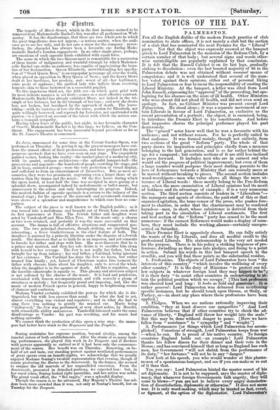La Aim, announced for some time at the Covent Garden
Opera, was performed on Thursday. In getting it up, the present managers have out- done the utmost efforts of their predecessors, and have produced the most gorgeous spectacle that we have ever seen on any stage. The exquisitely painted scenes, looking like reality—the market-place of a medireval city, with its quaint, antique architecture—the splendid banquet-hall—the processions and pageants—the hundreds of people crowding the stage, and all in busy, animated groups—were the very perfection of visual display, and sufficient to form an entertainment of themselves. But, as mere ac- cessories, they were too prominent, engrossing even a larger share of at- tention than the drama and the music. Of the five hours during which the opera lasted, at least half the time was occupied in mere gazing at a splendid show, accompanied indeed by melodramatic or ballet music, but unnecessary to the action and only interrupting its progress. Indeed, this modern fashion of operatic spectacle is a return to the infancy of the musical stage ; for the operas of the sixteenth and seventeenth centuries were shows of a splendour and magnificence to which ours bear no com- parison. The subject of the piece is well known to the English public; as it was turned into a melodrama and brought out at Drury Lane soon after its first appearance at Paris. The Jewish father and daughter were acted by Vandenhoff and Miss Ellen Tree. Of the music only a chorus or two were retained, and probably it was the more successful on that account. The drama is full of effective situations and exaggerated pas- sion. The two principal characters, though striking, are anything but interesting; a fierce vindictiveness is the chief feature of both. The daughter is pursued by a princely libertine under the disguise of a Jewish youth. She discovers that as to faith he is an impostor and yet consents to forsake her father and elope with him. he next discovers that he is a prince and married, and then her sole desire is to sacrifice him along with herself to her revenge. The Jew is not really her father, but has brought her up from infancy; her real father, a Cardinal, being ignorant of her existence. The Cardinal has done the Jew no harm, but rather treated him kindly; yet, hatred of Christians makes him torment the father with obscure hints about his daughter, only to reveal the whole when the daughter is in the agonies of death. All this is repulsive, and the horrible catastrophe is equally so. This gloomy and atrocious subject is not softened by the charms of the music. It is loud and ponderous, overloaded with brazen accompaniment, and with scarcely a gleam of sweetness or melody ; but frequently grand and imposing, and, like the music of modern French operas in general, happy in heightening scenes of clamour and confusion.
Madame Viardot certainly exhibited the powers for which she is dis- tinguished, but with less success than usual. In what she had to act, almost everything was violent and repulsive ; and in what she had to 7!ng there was nothing to gratify the musical ear. Mario being indisposed," the Jew was performed, at very short notice, by Maralti, with remarkable ability and success. Tamberlik laboured under the same disadvantage as Viardot : his part was revolting, and his music had nothing agreeable.
We cannot think the production of this opera a wise step : the mana- gers had better have stuck to the Huguenots and the Prophite.


























 Previous page
Previous page